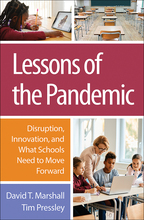Lessons of the Pandemic
Disruption, Innovation, and What Schools Need to Move Forward
David T. Marshall and Tim Pressley
Foreword by Harry Anthony Patrinos
HardcoverPaperbacke-bookprint + e-book
Hardcover
orderJanuary 3, 2024
ISBN 9781462553884
Price: $50.00 170 Pages
Size: 6" x 9"
Paperback
orderDecember 25, 2023
ISBN 9781462553877
Price: $33.00 170 Pages
Size: 6" x 9"
e-book
orderNovember 29, 2023
PDF and Accessible ePub ?
Price: $33.00 170 Pages
ePub is Global Certified Accessible
print + e-book $66.00 $39.60
orderPaperback + e-Book (PDF and Accessible ePub) ?
Price: 170 Pages
ePub is Global Certified Accessible
| Watch an interview with David T. Marshall and Tim Pressley. |  |
Read a Q&A with featured author, David T. Marshall!
“An invaluable treatment of COVID-19 and schools. Employing a comprehensive literature review, analyses of school responses in all 50 states, international comparisons, and unique teacher surveys and focus groups, Marshall and Pressley detail the errors of feckless policymakers while giving voice to the teachers who struggled through the pandemic with much fear and little leadership. Ultimately, U.S. schools dramatically reduced academic content, harming the most vulnerable students both intellectually and emotionally. We must read this history so that we may never repeat it.”

—Robert Maranto, PhD, 21st Century Chair in Leadership, Department of Education Reform, University of Arkansas
“Marshall and Pressley present a thorough, data-based evaluation of how schools' responses to the pandemic affected all stakeholders in our educational system. This book provides eye-opening information. It takes a deep dive into policies and practices that worked versus those that had a negative impact on students and teachers alike. The authors analyze an impressive range of sources to produce a fair, unbiased analysis. Not only does this book validate teachers' experiences with pandemic teaching, but it also identifies crucial lessons for governmental and educational decision makers.”

—Laura Cvitanovich, MS, Secondary English Instructor, Virtual Virginia, Virginia Department of Education
“Marshall and Pressley concisely show how the COVID-19 pandemic and the lockdown affected students' learning and the well-being of students and teachers, while exacerbating inequities in our educational system. This book goes beyond analyzing facts—it synthesizes recommendations for positive change and responsive leadership. A 'must read' for educators!”

—Heather L. Walter, EdD, College of Education and Human Development, George Mason University
“This book is well-structured and thoroughly referenced. The authors make credible, evidence-based arguments about the effects of the pandemic on students and teachers. The book fulfills the authors' intent of amplifying teachers’ voices by including both qualitative and quantitative data. Importantly, the authors recognize that we have very few pandemic-based intervention studies on which to base the way forward, and so they have based their plan on best practices established pre-pandemic in combination with the new insights gained from teachers. I highly recommend this compelling, comprehensive look at the pandemic and the next steps forward in educational recovery.”

—Laura Sokal, PhD, Faculty of Education, University of Winnipeg, Canada
“A thoughtful and fair reflection on an important intersection of public health and education. This book is informed by a well-rounded body of research, including robust data on teacher experiences during the pandemic. It provides important insight into the impacts of COVID-19 on K–12 education as well as a path forward to helping teachers better meet the needs of students and families.”

—Jeffrey Keese, PhD, Tift College of Education, Mercer University
—Robert Maranto, PhD, 21st Century Chair in Leadership, Department of Education Reform, University of Arkansas
“Marshall and Pressley present a thorough, data-based evaluation of how schools' responses to the pandemic affected all stakeholders in our educational system. This book provides eye-opening information. It takes a deep dive into policies and practices that worked versus those that had a negative impact on students and teachers alike. The authors analyze an impressive range of sources to produce a fair, unbiased analysis. Not only does this book validate teachers' experiences with pandemic teaching, but it also identifies crucial lessons for governmental and educational decision makers.”
—Laura Cvitanovich, MS, Secondary English Instructor, Virtual Virginia, Virginia Department of Education
“Marshall and Pressley concisely show how the COVID-19 pandemic and the lockdown affected students' learning and the well-being of students and teachers, while exacerbating inequities in our educational system. This book goes beyond analyzing facts—it synthesizes recommendations for positive change and responsive leadership. A 'must read' for educators!”
—Heather L. Walter, EdD, College of Education and Human Development, George Mason University
“This book is well-structured and thoroughly referenced. The authors make credible, evidence-based arguments about the effects of the pandemic on students and teachers. The book fulfills the authors' intent of amplifying teachers’ voices by including both qualitative and quantitative data. Importantly, the authors recognize that we have very few pandemic-based intervention studies on which to base the way forward, and so they have based their plan on best practices established pre-pandemic in combination with the new insights gained from teachers. I highly recommend this compelling, comprehensive look at the pandemic and the next steps forward in educational recovery.”
—Laura Sokal, PhD, Faculty of Education, University of Winnipeg, Canada
“A thoughtful and fair reflection on an important intersection of public health and education. This book is informed by a well-rounded body of research, including robust data on teacher experiences during the pandemic. It provides important insight into the impacts of COVID-19 on K–12 education as well as a path forward to helping teachers better meet the needs of students and families.”
—Jeffrey Keese, PhD, Tift College of Education, Mercer University



